Issue 15. 4 October 2010.pdf - UWA Staff - The University of Western ...
Issue 15. 4 October 2010.pdf - UWA Staff - The University of Western ...
Issue 15. 4 October 2010.pdf - UWA Staff - The University of Western ...
Create successful ePaper yourself
Turn your PDF publications into a flip-book with our unique Google optimized e-Paper software.
<strong>UWA</strong> NEWS<br />
4 OCTOBER 2010 Volume 29 Number 15<br />
Searching for a solution to hot spot threat<br />
PHOTO: <strong>The</strong> Fitzgerald River area is devastated by Phytophthora dieback<br />
by Lindy Brophy<br />
Visitors to the South West will be<br />
familiar with big expanses <strong>of</strong> dead<br />
and dying trees and shrubs.<br />
Most <strong>of</strong> us probably put this down to<br />
lack <strong>of</strong> rain or perhaps bushfire but it is<br />
actually a soil-borne pathogen,<br />
Phytophthora cinnamomi (Phytophthora<br />
dieback) which affects 40 per cent <strong>of</strong><br />
the native plant species in the South<br />
West <strong>of</strong> <strong>Western</strong> Australia.<br />
It is the single biggest threat to one <strong>of</strong> the<br />
world’s 34 International Biodiversity Hot<br />
Spots – the only hot spot in Australia.<br />
For many years, government and<br />
industry programs have successfully<br />
used the fungicide phosphite to reduce<br />
the spread and impact <strong>of</strong> Phytophthora<br />
dieback, but it has its own potential<br />
problems. A group in the School <strong>of</strong> Plant<br />
Biology is working to understand how<br />
phosphite works, in the search for an<br />
alternative treatment.<br />
Research Assistant Pr<strong>of</strong>essor Stuart<br />
Pearse and Research Associates Dr<br />
Ricarda Jost and Dr Xuanli Ma are<br />
members <strong>of</strong> a larger group <strong>of</strong><br />
researchers at <strong>UWA</strong> and Murdoch<br />
<strong>University</strong> which has an ARC Linkage<br />
Grant with industry partners to study<br />
Phytophthora dieback, the effects <strong>of</strong><br />
phosphite treatment and the sensitivity<br />
<strong>of</strong> native plants to phosphorus.<br />
“While phosphite is currently the best<br />
tool for managing the impact <strong>of</strong><br />
Phytophthora dieback in native plant<br />
communities in WA, we think that<br />
applications <strong>of</strong> phosphite may<br />
inadvertently be disrupting the natural<br />
balance <strong>of</strong> phosphorus in the soil,” said<br />
A/Pr<strong>of</strong>essor Pearse.<br />
“Our natural environment is particularly<br />
sensitive to phosphorus. Long-term use<br />
<strong>of</strong> phosphite could have a potential<br />
fertilisation effect by increasing the<br />
phosphorus in our extremely lowphosphorus<br />
ecosystems. This could<br />
promote invasion by weeds and other<br />
plant species that would otherwise not<br />
do well in the ecosystem,” he said.<br />
“It could also be impacting negatively on<br />
phosphorus-sensitive species. Further<br />
experimentation is required to determine if<br />
phosphite is having any negative impacts<br />
in native plant ecosystems in WA.”<br />
A/Pr<strong>of</strong>essor Pearse said Phytophthora<br />
dieback affected nearly 2,300 <strong>of</strong> the<br />
5,710 native plant species in the<br />
continued on page 2<br />
In this issue P3 ASTRONAUT INSPIRES STUDENTS P4 Climate Change QUESTIONS? Real Science Answers
Searching for a solution to hot spot threat<br />
from page 1<br />
South-West botanical province <strong>of</strong> WA. Its severe disruption <strong>of</strong><br />
plant community structure causes decline in species richness<br />
and abundance, degradation <strong>of</strong> habitats for animals and changes<br />
to ecosystem function and health, making it the most significant<br />
threat to landscapes and biodiversity in south-western Australia.<br />
“Its impact has been likened to a biological bulldozer and some<br />
botanists have indicated its impact on biodiversity is similar to<br />
the last ice-age!” he said.<br />
Phytophthora dieback was recognised in the Environmental<br />
Biodiversity and Conservation Act 1999 as a major threat to<br />
Australia’s biodiversity.<br />
Despite that, the Plant Biology group received only 27 per cent<br />
<strong>of</strong> the ARC funding it requested for this project. <strong>The</strong> importance<br />
<strong>of</strong> this research is demonstrated by the number <strong>of</strong> enthusiastic<br />
industry partners: ALCOA <strong>of</strong> Australia Ltd, Tiwest, BHP Billiton<br />
Worsley Alumina, <strong>Western</strong> Power and BHP Billiton SSM.<br />
<strong>The</strong> project is also supported by the Minerals and Energy<br />
Research Institute <strong>of</strong> <strong>Western</strong> Australia, the Department <strong>of</strong><br />
Environment and Conservation (DEC) as well as <strong>UWA</strong> and<br />
Murdoch <strong>University</strong>. DEC sprays phosphite aerially over<br />
selected biodiversity-rich sites in the Stirling Range National<br />
Park, the Fitzgerald River National Park and other areas <strong>of</strong> the<br />
south coast to control and prevent the impact and spread <strong>of</strong><br />
Phytophthora dieback.<br />
“Plants die quite quickly from Phytophthora dieback,”<br />
Dr Ricarda Jost said. “Banksias, native grass trees and other<br />
highly susceptible ‘indicator’ species tend to die first.<br />
“We hope that, by understanding how phosphite works, we will<br />
be able to substitute it with something else that doesn’t have<br />
phosphorus in it, or at least manage the application <strong>of</strong><br />
phosphite better, perhaps being able to reduce the quantities<br />
used,” she said.<br />
Stuart Pearse and Ricarda Jost do a lot <strong>of</strong> their work<br />
in the greenhouse<br />
Succulent response to drought<br />
It started with a dragon tree.<br />
“We’ve wanted to put one <strong>of</strong> these in on<br />
the campus for a long time,” said<br />
Grounds Supervisor Jamie Coopes.<br />
“<strong>The</strong>y are a great feature tree.”<br />
From it grew the stunning new succulent<br />
garden on the east side <strong>of</strong> the Willsmore<br />
and Tattersall lecture theatres.<br />
<strong>The</strong> UniGrounds staff sourced low-water<br />
species from around the Crawley<br />
campus, from nearby properties owned<br />
by the <strong>University</strong> and from the taxonomic<br />
garden.<br />
<strong>The</strong>re are already more than a dozen<br />
different species in the new garden and<br />
more will go in over the next few months.<br />
Jamie said that the tree aloes would<br />
grow to cover the east-facing wall in 10<br />
to 15 years. “This is a long-term garden,”<br />
he said. “We’re really pleased with it and<br />
we hope that staff and students will see<br />
how good a low-water garden can be<br />
and do the same at home.”<br />
He said the site was very hot in summer<br />
which made it difficult and wasteful to<br />
keep a water-hungry garden thriving.<br />
“We planted this garden two months ago<br />
and haven’t had to water it yet.”<br />
Next year the different varieties <strong>of</strong> aloes<br />
will flower in red, orange and yellow,<br />
making it even more spectacular.<br />
Jamie Coopes in the new garden<br />
2<br />
<strong>UWA</strong> NEWS 4 <strong>October</strong> 2010<br />
<strong>The</strong> <strong>University</strong> <strong>of</strong> <strong>Western</strong> Australia
Astronaut inspires students<br />
Andy Thomas with a captive audience in the Octagon<br />
Photo by Paul Ricketts, Centre for Learning Technology<br />
Space will become militarised; humans may never<br />
colonise other planets; and Australia should have its own<br />
space program.<br />
<strong>The</strong>se are some <strong>of</strong> the thoughts that Australia’s only astronaut,<br />
Andy Thomas, left with <strong>UWA</strong>’s Fogarty Scholars during his<br />
two-day visit to Perth last month.<br />
His visit was initiated by the Fogarty Foundation, a philanthropic<br />
and education foundation which engages leaders in their fields<br />
to speak about their achievements and their passions and<br />
encourages others to take leading roles in the community.<br />
Dr Thomas spoke to more than a thousand students and their<br />
teachers at events co-ordinated with <strong>UWA</strong>, Curtin <strong>University</strong> <strong>of</strong><br />
Technology, the International Centre for Radio Astronomy<br />
Research (ICRAR), Curtin <strong>University</strong>, Scitech, Aspire <strong>UWA</strong>, the<br />
<strong>UWA</strong>/WA Department <strong>of</strong> Education teachers’ enrichment<br />
program (SPICE) and the US Consul General.<br />
His most intimate chat was an hour with 40 Fogarty Scholarship<br />
winners who asked him about the value <strong>of</strong> postgraduate study,<br />
how the passion for the US space program could be reignited<br />
and what he did in his spare time on the Space Shuttle.<br />
“I loved postgraduate study,” he told them “I encourage<br />
anybody who has the opportunity to go for it. To be rid <strong>of</strong> the<br />
structures <strong>of</strong> undergraduate study and, for the only time in your<br />
life, to be able to focus on just one thing is a real privilege.”<br />
Dr Thomas did his PhD in mechanical engineering at the<br />
<strong>University</strong> <strong>of</strong> Adelaide, where he became close friends with<br />
former <strong>UWA</strong> lecturer Dr Michael Norton.<br />
Dr Norton arranged Dr Thomas’ first visit to <strong>UWA</strong> in 1996 and<br />
gave him the tiny silk <strong>UWA</strong> flag which the astronaut took into<br />
space with him, and which is now displayed at the <strong>UWA</strong><br />
Visitors Centre.<br />
He said interest in the US space program had dwindled<br />
because the education system had failed to ascribe value to it.<br />
“<strong>The</strong> wider community just doesn’t see the value <strong>of</strong> it,”<br />
Dr Thomas said.<br />
He said that space would definitely become militarised.<br />
“<strong>The</strong>re are no two ways about it. It gives you great strategic<br />
benefit. That’s why Australia should get its own space program.<br />
Satellites are the best way to ensure national security, to protect<br />
Australia’s vast shoreline, to give access to information for<br />
environmental studies and so much more.”<br />
Dr Thomas said he could not see humans getting any further<br />
than Mars. “It may be that it is just not physically possible to go<br />
any further. We don’t even know the technology that might be<br />
needed.<br />
“We have got to take care <strong>of</strong> the Earth. It’s irresponsible for<br />
people to say that we will eventually go somewhere else to live.”<br />
During Space Shuttle flights, Dr Thomas listened to Beethoven,<br />
Bach and the Beatles. “While we keep to Greenwich Mean<br />
Time, we actually experience 16 sunrises and sunsets every 24<br />
hours,” he told the students. “When Paul McCartney heard that<br />
I’d played Here Comes the Sun on the shuttle, he invited me<br />
onto the stage at one <strong>of</strong> his concerts.”<br />
Dr Thomas has flown four space flights, including a longduration<br />
flight with Russian cosmonauts on the Russian Space<br />
Station Mir for 130 days.<br />
“That was the best flight because it was long and the pace<br />
slows and your can savour the experience,” he said. “I also<br />
enjoyed the intellectual challenge <strong>of</strong> learning Russian.”<br />
He told the students not to rely on chance, not to wait for a<br />
good opportunity to come along. “Make it happen. Be<br />
tenacious. Find out what needs to be done to achieve your goal<br />
and do it. You will be amazed at what doors will be unlocked.”<br />
<strong>The</strong> <strong>University</strong> <strong>of</strong> <strong>Western</strong> Australia <strong>UWA</strong> NEWS 4 <strong>October</strong> 2010 3
Celebrating<br />
21 years<br />
<strong>of</strong> our<br />
School <strong>of</strong><br />
Indigenous<br />
Studies<br />
Our School <strong>of</strong> Indigenous Studies<br />
celebrated 21 highly successful years<br />
last week – a milestone that could not<br />
have been reached without the<br />
dedication and intellectual zeal <strong>of</strong> the<br />
School’s former and present staff and<br />
students.<br />
This School plays a vital role in our<br />
<strong>University</strong>, providing Indigenous<br />
leadership, a visible and vibrant<br />
Indigenous community on campus, and<br />
an accessible entry point for Indigenous<br />
students and communities.<br />
Certainly, within our <strong>University</strong>,<br />
Indigenous education is integral to our<br />
activities. In fact, Indigenous knowledge<br />
is one <strong>of</strong> the six priority areas for our<br />
research. <strong>The</strong> principle that guides our<br />
activities is the respect <strong>of</strong> Indigenous<br />
people and their culture.<br />
We are particularly proud <strong>of</strong> our strong<br />
track record in graduating Indigenous<br />
students from pr<strong>of</strong>essional degrees such<br />
as Law, Medicine and Engineering – a<br />
record only possible through the<br />
fantastic efforts <strong>of</strong> the School’s staff and<br />
students.<br />
Led by Winthrop Pr<strong>of</strong>essor Jill Milroy, the<br />
School has established strong and<br />
extensive links to establish effective<br />
pathways for Indigenous students from<br />
secondary school to <strong>University</strong>. <strong>The</strong><br />
School also has a strong publication<br />
record, particularly in Indigenous<br />
knowledge and oral history.<br />
Alan Robson<br />
Vice-Chancellor<br />
Some years ago there was a special<br />
edition <strong>of</strong> the highly respected medical<br />
journal <strong>The</strong> Lancet focusing on<br />
Indigenous health research. <strong>The</strong> front<br />
cover <strong>of</strong> that special edition was blank<br />
but for a single paragraph from an<br />
editorial which read:<br />
“<strong>The</strong> most urgent call <strong>of</strong> all is to<br />
remove the cloak <strong>of</strong> invisibility from the<br />
shoulders <strong>of</strong> Indigenous peoples… to<br />
protect and strengthen their essential,<br />
foundational place in human society.”<br />
Given this – and the fact that tertiary<br />
education is recognised as ‘a critical<br />
pillar <strong>of</strong> human development<br />
worldwide’, the important role <strong>of</strong><br />
universities in engaging with<br />
Indigenous issues becomes clear.<br />
Universities play a significant<br />
leadership role within our communities<br />
and it is from research and scholarship<br />
that we can continue to work towards<br />
changing society, creating a future<br />
where all people are equal and where<br />
we celebrate rich cultural differences.<br />
Our role, as educators in general, is<br />
now more critical than ever in the<br />
construction <strong>of</strong> civil societies which<br />
understand and respect all cultures<br />
– particularly Indigenous cultures.<br />
<strong>The</strong>re is no doubt that by exploring<br />
and acknowledging our shared<br />
heritage, and by coming to<br />
understand and respect cultural<br />
differences we can make our<br />
community and our society a better<br />
place in which to live.<br />
Forget<br />
the<br />
debate...<br />
<strong>The</strong> current “debate” about whether<br />
the climate is changing seems to be<br />
a uniquely Australian phenomenon.<br />
“<strong>The</strong>re IS no debate about the<br />
fundamentals in Europe,” said Pr<strong>of</strong>essor<br />
Stephan Lewandowsky. “<strong>The</strong>y are just<br />
getting on with reducing their carbon<br />
emissions. Debate is completely<br />
unnecessary in light <strong>of</strong> the overwhelming<br />
scientific evidence.”<br />
But in Australia, people are still arguing<br />
whether sea levels are rising, whether<br />
human beings and their activities are to<br />
blame for global warming, whether we<br />
should have carbon credits.<br />
Pr<strong>of</strong>essor Lewandowsky (a cognitive<br />
scientist) and two <strong>UWA</strong> colleagues,<br />
Pr<strong>of</strong>essor Malcolm McCullough<br />
(Premier’s Research Fellow in the<br />
Oceans Institute and Fellow <strong>of</strong> the Royal<br />
Society) and mathematician Pr<strong>of</strong>essor<br />
Kevin Judd, formed a group dedicated<br />
to exploring and communicating climate<br />
science.<br />
In less than 12 months, the group has<br />
grown to include about 40 <strong>UWA</strong><br />
academics and others from the Bureau<br />
<strong>of</strong> Meteorology and CSIRO.<br />
“<strong>The</strong> purpose <strong>of</strong> this group is to provide<br />
real science information and reach out to<br />
the community,” Pr<strong>of</strong>essor<br />
Lewandowsky said.<br />
His involvement began as a cognitive<br />
scientist with his investigations into<br />
scepticism. “I started looking at the<br />
climate change literature and discovered a<br />
huge discrepancy between what the<br />
literature said and the <strong>of</strong>ten misleading<br />
and false statements made by some in the<br />
media and politics, and realised that it was<br />
important that we counter that,” he said.<br />
“We are not a research group, even<br />
though most <strong>of</strong> us are doing research<br />
associated with climate change. We just<br />
want to communicate real scientific<br />
answers to climate questions, to dispel the<br />
unfounded scepticism that is encouraged<br />
by a small sector in the community which<br />
4<br />
<strong>UWA</strong> NEWS 4 <strong>October</strong> 2010<br />
<strong>The</strong> <strong>University</strong> <strong>of</strong> <strong>Western</strong> Australia
... it’s<br />
time for<br />
action<br />
usually has vested interests in keeping<br />
the energy status quo.”<br />
With funding from the Vice-Chancellor<br />
Pr<strong>of</strong>essor Alan Robson, Pro Vice-<br />
Chancellor Pr<strong>of</strong>essor Alistar Robertson,<br />
the Science faculties, the Engineering<br />
faculty, and the School <strong>of</strong> Psychology,<br />
the group has hosted two big public<br />
events, in December and June.<br />
<strong>The</strong>y have a fortnightly spot on radio<br />
RTR-FM 92.1 on which Pr<strong>of</strong>essor Judd<br />
or Pr<strong>of</strong>essor Lewandowsky essentially<br />
deliver a three-minute lecture on an<br />
aspect <strong>of</strong> climate change.<br />
<strong>The</strong> lecture is then posted on a science<br />
blog run by a UQ physics graduate,<br />
www.skepticalscience.com<br />
“This blog had 400,000 hits in March,<br />
from people who spent long enough to<br />
look at three pages,” Pr<strong>of</strong>essor<br />
Lewandowsky said. “<strong>The</strong> blogger, John<br />
Cook, is co-ordinating the contents <strong>of</strong><br />
his site closely with scientists around<br />
Australia and the world.”<br />
All members <strong>of</strong> the group contribute to<br />
public debate about science. Pr<strong>of</strong>essor<br />
Lewandowsky has repeatedly written<br />
about climate change on the ABC’s<br />
website <strong>The</strong> Drum, and Pr<strong>of</strong>essor<br />
McCulloch gives public lectures as part<br />
<strong>of</strong> his Premier’s Fellowship. Pr<strong>of</strong>essor<br />
Judd has been interviewed on ABC radio<br />
and met with politicians in Canberra. WA<br />
Chief Scientist Pr<strong>of</strong>essor Lyn Beazley<br />
supports the group and chaired one <strong>of</strong><br />
the public meetings.<br />
“Our group is still building but we are<br />
getting the message out there,” he said.<br />
“We welcome scientific input from<br />
anybody else who wants to get<br />
involved.”<br />
“Two independent peer-reviewed papers<br />
have recently established that 97 per<br />
cent <strong>of</strong> all active climate scientists agree<br />
that we cause climate change. It’s time<br />
we stopped talking and started doing<br />
something about it.<br />
“<strong>The</strong> real problem is not that people<br />
are not turning <strong>of</strong>f their appliances but<br />
that the power to run those appliances<br />
is generated in the worst possible way<br />
in Australia compared to other<br />
developed countries. According to the<br />
OECD, only Mongolia and North Korea<br />
emit significantly more CO 2 per unit<br />
energy produced than Australia, and<br />
we emit more than three times as much<br />
as Sweden.<br />
“We need to look at other economies:<br />
Portugal is already producing 45 per<br />
cent <strong>of</strong> its power from renewable<br />
sources; Germany has more solar power<br />
than Australia; and the EU reduced coal<br />
consumption by 16.3 per cent in 2009<br />
alone. Between 1990 and 2009,<br />
Germany reduced its greenhouse gas<br />
emissions by 28 per cent and is on<br />
target to reduce them by a further 40 per<br />
cent. In that time, Australia’s emissions<br />
increased by eight per cent. Over the<br />
same period, the German economy grew<br />
by 32 per cent. <strong>The</strong>y employed 350,000<br />
people last year in the clean energy<br />
sector and emit about half as much<br />
CO 2 as we do for each dollar <strong>of</strong> GDP.”<br />
US climate change authority and<br />
author Pr<strong>of</strong>essor Naomi Oreskes<br />
from the <strong>University</strong> <strong>of</strong> California will<br />
be the star attraction at the group’s<br />
event in November.<br />
For more information about<br />
the visit and the group, go to<br />
www.climatescienceWA.org<br />
which links to the <strong>UWA</strong> website.<br />
<strong>The</strong> go-to group for climate change questions: (back, from left):<br />
Associate Pr<strong>of</strong>essor Nancy Longnecker (Science Communication); Pr<strong>of</strong>essor<br />
Malcolm McCulloch (Premier’s Research Fellow); Asst/Pr<strong>of</strong>essor Thomas Stemler<br />
(Mathematics and Statistics); Asst/Pr<strong>of</strong>essor Julie Trotter (Oceans Institute);<br />
Pr<strong>of</strong>essor Kevin Judd (Mathematics and Statistics); and (front)<br />
Pr<strong>of</strong>essor Stephan Lewandowsky (Pr<strong>of</strong>essorial Fellow, Psychology)<br />
<strong>The</strong> <strong>University</strong> <strong>of</strong> <strong>Western</strong> Australia <strong>UWA</strong> NEWS 4 <strong>October</strong> 2010 5
A digital<br />
future<br />
for<br />
libraries<br />
<strong>University</strong> Librarian and IT Director Dr Mary Davies<br />
Computers and books were<br />
positioned, at the end <strong>of</strong> last century,<br />
at opposite ends <strong>of</strong> the cultural and<br />
intellectual spectrum.<br />
But as both information technology and<br />
libraries experience rapid change,<br />
computers and books are now merging:<br />
friends rather than foes; partners in<br />
education, research and knowledge<br />
transfer.<br />
<strong>The</strong> new <strong>University</strong> Librarian and Director<br />
<strong>of</strong> Information Management, Dr Mary<br />
Davies, is both an information scientist<br />
and a chartered librarian with an MSc<br />
degree in Managing Information<br />
Technology. She is ready to meet the<br />
challenge <strong>of</strong> an exponential growth in<br />
digital media.<br />
“Both staff and students have increased<br />
expectations in this area,” Dr Davies<br />
said. “We are concentrating on<br />
integrating staff and services from the<br />
library and ITS into an Information<br />
Services department. <strong>The</strong> staffs have<br />
complementary and overlapping skills<br />
and, together, they will be a much<br />
stronger team with greater clarity in<br />
service provision supporting research,<br />
teaching and learning, and central<br />
administration, respectively.”<br />
Dr Davies’ initial plan for Information<br />
Services is to make its services more<br />
strategic in support <strong>of</strong> corporate<br />
objectives to help <strong>UWA</strong> flourish in an<br />
internationally competitive higher<br />
education market.<br />
“We will <strong>of</strong>fer better services and give<br />
staff the opportunity to multi-skill, which<br />
will create a more flexible workforce<br />
being pro-active rather than reactive in<br />
service provision,” she said.<br />
Dr Davies was formerly the Deputy Chief<br />
Information Officer and Director <strong>of</strong><br />
Research and Learning Support at<br />
King’s College London. She successfully<br />
led the development <strong>of</strong> King’s<br />
Information and Knowledge Strategy,<br />
including the roll-out <strong>of</strong> the first centrallysupported<br />
e-learning system at King’s.<br />
She won a King’s Pr<strong>of</strong>essional Services<br />
award for her outstanding contribution to<br />
the development <strong>of</strong> a research<br />
information management system.<br />
“Libraries now <strong>of</strong>fer information<br />
management, citation analyses,<br />
information technology and a whole<br />
range <strong>of</strong> services but, despite the<br />
changing character <strong>of</strong> libraries and<br />
knowledge systems, there will always be<br />
a place for books,” she said.<br />
“Part <strong>of</strong> the book budget is for<br />
undergraduate texts, <strong>of</strong> which we would<br />
have multiple copies. But more <strong>of</strong> them<br />
are now becoming available online and<br />
when we buy a licence for multiple<br />
electronic access, there can be virtually<br />
one for every student, to access<br />
anywhere at any time. It beats having to<br />
put your name down and wait for one <strong>of</strong><br />
the 10 hard copies to become available.”<br />
Dr Davies said students would always<br />
come to a library to work, even when<br />
they could read their texts and journals<br />
on their laptops.<br />
“<strong>The</strong>y will always come to a positive<br />
learning environment. <strong>The</strong>y may not have<br />
a good physical environment in which to<br />
study at home, and they always like to<br />
be surrounded by others who are<br />
studying, either to interact with them or<br />
just to be part <strong>of</strong> an environment that<br />
encourages them to work and not to be<br />
distracted,” she said.<br />
Dr Davies is in charge <strong>of</strong> 224 staff and<br />
says that they all face great challenges<br />
currently and into the future.<br />
“I am interested in capitalising on the<br />
evolution <strong>of</strong> both the library and IT<br />
pr<strong>of</strong>essions to make them future-pro<strong>of</strong>,”<br />
she said.<br />
6<br />
<strong>UWA</strong> NEWS 4 <strong>October</strong> 2010<br />
<strong>The</strong> <strong>University</strong> <strong>of</strong> <strong>Western</strong> Australia
Footy, Scrabble and flying high all<br />
part <strong>of</strong> the experience<br />
Wang Xuelu takes <strong>of</strong>f in a Tiger Moth<br />
Five young students from the <strong>University</strong> <strong>of</strong> Science and<br />
Technology China had what might be described as a<br />
well-balanced stay at <strong>UWA</strong> in August.<br />
After spending six weeks with an academic supervisor and a<br />
postgraduate student mentor, they farewelled the <strong>University</strong><br />
with comments including:<br />
“I loved the challenge <strong>of</strong> research in the lab and I loved the<br />
morning teas”; “My experience here has been very good,<br />
including my experience <strong>of</strong> footy and nightclubs”; “I learned<br />
about Arabidopsis and I also learned to play Scrabble”; and<br />
“I learned a lot about research and also about the comfortable<br />
way <strong>of</strong> life in Australia.”<br />
<strong>The</strong> students’ internship developed as a consequence <strong>of</strong> an<br />
Endeavour Executive Award won by Dr Judy Berman,<br />
Associate Director, Research Development, to increase<br />
research linkages with China.<br />
She went to China last summer to map their research strengths<br />
against ours, intending to concentrate on Nanjing and Zhejiang,<br />
but when it emerged that USTC was interested in developing a<br />
research training exchange program with <strong>UWA</strong>, based on one<br />
they had with the <strong>University</strong> <strong>of</strong> California Los Angeles (which<br />
they had previously discussed with our VC), she worked with<br />
their International Office to make it happen.<br />
“<strong>The</strong>se students are some <strong>of</strong> the best in China,” Dr Berman<br />
said. “<strong>The</strong>y are undergraduates and the research training<br />
program we <strong>of</strong>fered them here was during their summer break,<br />
between their third and fourth years <strong>of</strong> study. We embedded<br />
their training in research labs with leading researchers and<br />
assigned them each a postgraduate student mentor.<br />
“We hope that they will now be spreading the word about <strong>UWA</strong>,<br />
raising our pr<strong>of</strong>ile at USTC and some <strong>of</strong> them will hopefully be<br />
planning to come back here for postgraduate work.”<br />
Pr<strong>of</strong>essor Don Robertson supervised Ji Chen in his Auditory<br />
Laboratory, in Biomedical, Biomolecular and Chemical<br />
Sciences; Pr<strong>of</strong>essor David Blair took Wang Jiang under his<br />
wing in the Australian International Gravitational Research<br />
Centre, in Physics; Wang Xuelu was supervised by Pr<strong>of</strong>essor<br />
Alice Vrielink, also in BBCS; Dr Katharine Howell stepped in for<br />
Pr<strong>of</strong>essor Ian Small, Director ARC Centre <strong>of</strong> Excellence in Plant<br />
Energy Biology, to take Zheng Fengya into their laboratories<br />
while Pr<strong>of</strong>essor Small was overseas; and Yuan Hongyuan was<br />
also in Physics, supervised by Pr<strong>of</strong>essor Bob Stamps.<br />
Dr Berman provided a sumptuous feast <strong>of</strong> cultural experiences for<br />
the students, including homestays with Australian families, visits to<br />
AQWA (underwater park), Caversham Wildlife Park, Rottnest (with<br />
Pr<strong>of</strong>essor Vrielink), the Gingin observatory and even a flight in a<br />
Tiger Moth with Pr<strong>of</strong>essor Ian McArthur, Head <strong>of</strong> Physics.<br />
“<strong>The</strong> visit to Gingin was the highlight for all <strong>of</strong> them,” Dr Berman<br />
said. “<strong>The</strong>re was a Chinese student there from USTC who had<br />
just finished his PhD and he took great care <strong>of</strong> them, showing<br />
them around the observatory, taking them to nearby Yanchep<br />
and introducing them to koalas and our wildflowers.”<br />
She said she had heard from the International Office at USTC<br />
that there have already been many enquiries from USTC staff<br />
and students about next year’s program.<br />
Dr Jo Edmondston from the Graduate Education Office ran a<br />
study skills seminar for the visiting students, who had to deliver an<br />
oral presentation on their research before they left <strong>UWA</strong>, and a<br />
written report in their own language when they returned to China.<br />
<strong>The</strong>y also spent some time with Pr<strong>of</strong>essor Gary Sigley,<br />
Pr<strong>of</strong>essor Barry Marshall, Pr<strong>of</strong>essor Dongke Zhang, and at the<br />
Centre for Microscopy, Characterisation and Analysis. Katherine<br />
Webster from the International Office informed them about<br />
postgraduate funding available for overseas students.<br />
<strong>The</strong> <strong>University</strong> <strong>of</strong> <strong>Western</strong> Australia <strong>UWA</strong> NEWS 4 <strong>October</strong> 2010 7
Dreams made to order<br />
Engineering students change the lives <strong>of</strong> people with disabilities<br />
A huge workshop, eight <strong>of</strong>fices, 67 students, a charitable<br />
foundation and a phone that never stops ringing.<br />
This is Darren Lomman’s domain: the founder and CEO <strong>of</strong><br />
Dreamfit Foundation, a unique <strong>Western</strong> Australian not-for-pr<strong>of</strong>it<br />
organisation helping people with disabilities to realise their dreams.<br />
Dreamfit uses innovative engineering solutions to design and<br />
create recreation equipment for people who never thought they<br />
could surf, ride a bike or climb a tower.<br />
Six years ago, Darren designed and built a motorbike for a<br />
paraplegic friend, as his final year engineering project.<br />
Last month, the foundation’s<br />
new home, Dreamplex, opened<br />
at <strong>UWA</strong>’s Shenton Park Field<br />
Station and Darren’s work was<br />
applauded by 140 guests,<br />
including the chair <strong>of</strong> the<br />
Dreamfit board, Vice-Chancellor<br />
Alan Robson, WA’s Chief<br />
Scientist Pr<strong>of</strong>essor Lyn Beazley,<br />
CEO <strong>of</strong> Wesfarmers Richard<br />
Goyder, and Malcolm and Tonya<br />
McCusker from the McCusker<br />
charitable foundation.<br />
<strong>The</strong> cavernous headquarters were donated by the <strong>University</strong>,<br />
and Wesfarmers paid for the removal <strong>of</strong> asbestos and the<br />
recladding <strong>of</strong> the building, the single biggest cost in the<br />
renovation and refit that turned an empty warehouse into a<br />
creative hub.<br />
Hames Sharley architects took on all the design and<br />
engineering work and did the contracting work. Global<br />
Construction Services donated eight prefabricated site <strong>of</strong>fices,<br />
complete with air-conditioning, plumbing and wiring, that have<br />
now been incorporated into the main building.<br />
Thirteen fully-equipped work stations were sponsored by<br />
different companies, including Starbucks, which paid for four.<br />
Donations and work by volunteers meant that the huge refit<br />
was completed for less than $10,000. Now 67 engineering<br />
students are working on Dreamfit projects, under six different<br />
Now 67 engineering students<br />
are working on Dreamfit<br />
projects, under six different<br />
supervisors<br />
supervisors. More than 30 <strong>of</strong> them are involved with the<br />
Dreamcatcher project, co-ordinated by Dr Nathan Scott.<br />
<strong>The</strong> project is a competition between teams <strong>of</strong> engineering<br />
students to create the best solutions for three Perth people with<br />
disabilities.<br />
<strong>The</strong> first is 12-year-old Sladjana Miljailovic who wants to be able<br />
to draw and paint independently. Sladjana, who has won prizes<br />
for her art, holds her pencils and brushes in her mouth as she<br />
has quadriplegia, but she can only pursue her passion when<br />
other people can help. She would like to be able to drive her<br />
wheelchair up to an easel, choose her own colours, squeeze<br />
them onto a palate, select a<br />
brush or two and complete a<br />
painting without having to ask<br />
for assistance. Sladjana hopes<br />
that one day she may be able to<br />
use her talent as a source <strong>of</strong><br />
income. Three groups <strong>of</strong><br />
students are working on a<br />
motorised easel for her.<br />
Imran Ariff has cerebral palsy.<br />
<strong>The</strong> 30-year-old dreams <strong>of</strong> being<br />
able to complete a gym workout independently on a single<br />
machine without the need for assistance between machines<br />
and equipment. <strong>The</strong> final three teams chosen for this challenge<br />
are building a piece <strong>of</strong> equipment which will provide the support<br />
Imran needs and <strong>of</strong>fer him an independent workout.<br />
<strong>The</strong> final challenge is to design a seated water ski for 50-yearold<br />
Karen Anderson, who also has cerebral palsy. She currently<br />
uses a sit ski but it is heavy and needs two people to launch it.<br />
Like Sladjana and Imran, Karen would love to indulge her<br />
passion without having to depend on other people.<br />
This year, occupational therapy students from Edith Cowan<br />
<strong>University</strong> are helping with the designs. And again each <strong>of</strong> the<br />
final 12 teams has funding, support and a mentor from industry.<br />
Dr Nathan Scott, senior lecturer in Mechanical and Chemical<br />
Engineering, is supervising the 32 students, who have until<br />
mid-November to complete their projects.<br />
Darren with the sit ski<br />
Juan Lim and Adam Stephen work on gym equipment<br />
8<br />
<strong>UWA</strong> NEWS 4 <strong>October</strong> 2010<br />
<strong>The</strong> <strong>University</strong> <strong>of</strong> <strong>Western</strong> Australia
Darren Lomman in the Dreamplex: the bike modification will become Dreamfit’s first production run<br />
“All 200 <strong>of</strong> the students in one <strong>of</strong> my first semester classes did<br />
preliminary designs, then they put their hands up if they wanted<br />
to continue with the project,” Dr Scott said.<br />
“<strong>The</strong> biggest challenge for them is that they are all doing a full<br />
academic load, so they have assignments and other studies<br />
that take them away from the project.”<br />
He said the students were all learning new skills to be able to<br />
build their designs. “This is one <strong>of</strong> the driving forces behind the<br />
Dreamcatcher project and, indeed, many educational initiatives<br />
in the Faculty, to stretch the students, to put them into real<br />
situations, to teach them new skills, so they can develop<br />
equipment that works, that is safe, that is what the client wants<br />
and needs,” he said.<br />
Last year the competition threw out the challenge to more than<br />
200 students to design and build a bicycle for a nine-year-old<br />
boy with no arms, Josiah Kappert, who was born without arms,<br />
is now happily riding with his parents and sisters, after choosing<br />
his favourite bike from the four finalists.<br />
One <strong>of</strong> the bikes he didn’t choose won the engineering award<br />
and the detachable modification is soon to become Dreamfit’s<br />
first production run.<br />
“You have no idea how many requests we’ve received from<br />
people all over Australia for bicycles for kids with no arms,”<br />
Darren said. “This design is great because it can easily be fitted<br />
onto a normal bike, then taken <strong>of</strong>f again when the rider<br />
outgrows the bike.”<br />
Alongside the Dreamcatcher projects are a hovercraft and ski<br />
boat, on which Darren has been working for a few years, a<br />
motorbike for a quadriplegic which can be controlled from the<br />
side car, and a seated surfboard.<br />
“I took a young guy with cerebral palsy out surfing and he was<br />
able to tell me, by widening his eyes for ‘yes’ and screwing up<br />
his face for ‘no’, that it was uncomfortable for him to lie down<br />
on the surfboard,” Darren said.<br />
“So we’re working on a seated surfboard, which is steered by<br />
the surfer leaning on the armrests. It will be used by a disabled<br />
surfing association that take hundreds <strong>of</strong> people with different<br />
disabilities out surfing four times a year.”<br />
This is when Darren is happiest, being hands-on.<br />
“It’s not hard to be hands-on when you’re the only one here,”<br />
he laughed. He has a part-time finance <strong>of</strong>ficer and the<br />
McCusker Foundation is planning to fund an operations<br />
manager for two days a week. But all the other people who<br />
keep Dreamfit going are volunteers.<br />
Darren’s phone rings constantly with requests. “<strong>The</strong> worst part<br />
<strong>of</strong> my job is saying no,” he said. “I hope that, one day, I won’t<br />
have to.”<br />
Darren is happiest,<br />
being hands-on<br />
While on his Churchill Fellowship last year (50 cities across<br />
Europe and the US in five months), two ideas caught his<br />
imagination and he wants to put them together.<br />
“I’m always hearing about people who want to walk again. Well,<br />
this might, just might, be an answer. I saw a mind-controlled<br />
wheelchair which moves right or left or forward or backward<br />
based on what the person in the chair is thinking.<br />
“In another place I saw a suit like an exoskeleton that you can<br />
put on to strengthen your muscles. It’s being used by nurses to<br />
help them lift heavy patients.<br />
“Well, what about if we put those two together? If somebody<br />
could wear the exoskeleton and think ‘left leg, right leg…’?<br />
“It’s many years away, but I would love to get an ARC grant to<br />
explore it one day.<br />
“It might sound crazy but hey, that’s what we’re about here –<br />
dreams and finding a way to make them come true!”<br />
<strong>The</strong> <strong>University</strong> <strong>of</strong> <strong>Western</strong> Australia <strong>UWA</strong> NEWS 4 <strong>October</strong> 2010 9
Healthy minds at <strong>UWA</strong><br />
Next week is Mental Health Week at <strong>UWA</strong> and around the state<br />
Flowchart will help with a mental health crisis<br />
By Pauline Pannell, Disability Officer, UniAccess<br />
Everyone deserves the opportunity to maintain good<br />
mental health.<br />
Like dental hygiene or good nutrition, looking after our mental<br />
health should be a conscious part <strong>of</strong> everyday life for each <strong>of</strong><br />
us. Around one fifth <strong>of</strong> us, through no fault <strong>of</strong> our own, need<br />
additional support to maintain mental health.<br />
Before starting at <strong>UWA</strong> in 2008 I worked as a Registered<br />
Psychologist for many years assisting young people and their<br />
families and I have a huge respect for people challenged by<br />
mental health problems.<br />
In contrast to the outdated community perceptions that mental<br />
health problems are a sign <strong>of</strong> weakness, most <strong>of</strong> the people I<br />
worked with showed a lot <strong>of</strong> courage and resilience in getting<br />
on with their lives while managing the challenges <strong>of</strong> their health.<br />
I am now one <strong>of</strong> the Disability Officers in UniAccess, part <strong>of</strong><br />
Student Support Services at <strong>UWA</strong>. UniAccess provides<br />
assistance in managing academic demands for students with a<br />
medical condition or disability. I see the same courage and<br />
resilience in our students who seek assistance with the impact<br />
<strong>of</strong> their mental health challenges on their studies.<br />
For some small number <strong>of</strong> people affected by mental health<br />
problems, despite their best efforts, there may still be very<br />
challenging or high risk times, when something beyond the<br />
person’s control triggers a crisis.<br />
When a student or staff member is in need <strong>of</strong> urgent help due<br />
to a mental health problem, it is important for those around him<br />
or her to act quickly and effectively to provide the best<br />
immediate support for that person.<br />
I am part <strong>of</strong> a <strong>UWA</strong> Mental Health working group which has<br />
been meeting over the past two years. Our priority was the<br />
development <strong>of</strong> a clear process for assisting anyone in the<br />
campus community experiencing a crisis due to mental health<br />
issues. We were supported by a new mental health policy, also<br />
developed by the group. We have representatives from the<br />
Academic <strong>Staff</strong> Association, Student Services (the <strong>UWA</strong><br />
Medical Centre, UniAccess, Counselling Services and the<br />
Health Promotion Unit) and Human Resources (Equity and<br />
Diversity and Safety and Health)<br />
<strong>The</strong> group worked together to develop a simple clear process<br />
for supporting a person experiencing a Mental Health Crisis.<br />
A flowchart sets out in simple language what to do if:<br />
• the person is willing to accept help and can wait for<br />
assistance, then contacting services such as Student<br />
Counselling Services (6488 2423), UniAccess (6488 2423) or<br />
in the case <strong>of</strong> employees, our Employee Assistance Program<br />
provider (1300 361 008);<br />
• the person needs assistance immediately, in which case the<br />
Mental Health Emergency Response Line (1300 555 788)<br />
(24 hours) or Crisis Care (9223 1111) (24 hours) should be<br />
contacted; and<br />
• the person is behaving in a way which puts themselves or<br />
others at risk, in which case people should always ensure<br />
their own safety and <strong>UWA</strong> security should be called (6488<br />
2222 or a free call from a public phone 1800 655 222).<br />
<strong>The</strong> flowchart is designed so that any member <strong>of</strong> the <strong>UWA</strong><br />
community can use it. Posters will soon be distributed<br />
throughout the campus so that everyone can become familiar<br />
with this process. Contact Averil Riley 6488 2784 for a copy.<br />
Pauline Pannell (Student Services)<br />
10<br />
<strong>UWA</strong> NEWS 4 <strong>October</strong> 2010<br />
<strong>The</strong> <strong>University</strong> <strong>of</strong> <strong>Western</strong> Australia
New <strong>UWA</strong> Mental Health Policy<br />
A <strong>UWA</strong> Mental Health policy has been developed by the<br />
<strong>UWA</strong> Mental Health Working Group.<br />
It will be available soon at:<br />
www.universitypolicies.uwa.edu.au/search<br />
<strong>The</strong> objective <strong>of</strong> the policy is to raise awareness and<br />
understanding <strong>of</strong> the needs <strong>of</strong> people with a mental health<br />
problem, and to support individual future success through<br />
prevention strategies, early intervention and appropriate<br />
management.<br />
<strong>The</strong> <strong>University</strong> aims to:<br />
• recognise the needs <strong>of</strong> those who are currently well by<br />
<strong>of</strong>fering opportunities for education and skills development;<br />
• support those at risk <strong>of</strong> developing a mental health problem<br />
through the timely use <strong>of</strong> education and support strategies; and<br />
• assist those who are experiencing a mental health problem<br />
as well as those who are supporting students, colleagues<br />
and/or peers experiencing a mental health problem.<br />
<strong>The</strong> formulation <strong>of</strong> this policy recognises that there is more to<br />
mental health than dealing with mental illness. Reducing stigma,<br />
building resilience and providing support to people in our<br />
<strong>University</strong> community who may be at risk are considered<br />
equally important components.<br />
Help for students<br />
By Alex Clark<br />
<strong>UWA</strong> Health Promotion Unit<br />
Recent research has found that 48 per cent <strong>of</strong> Australian<br />
university students are psychologically distressed, with<br />
lower perceived quality <strong>of</strong> life and self-rated health than<br />
their age-matched peers.<br />
<strong>UWA</strong> recognises the potential for such problems to affect not<br />
only the individual but to inhibit the success <strong>of</strong> the organisation<br />
and the healthy functioning <strong>of</strong> its community. <strong>The</strong> Mental Health<br />
Network is the latest initiative by the <strong>UWA</strong> Health Promotion<br />
Unit, which aims to inform individuals on how to recognise<br />
mental health problems and ways to deal with these.<br />
<strong>The</strong> project is being run by final year Health Science student<br />
Alex Clark, who is currently completing a 450 hour practicum<br />
with the <strong>UWA</strong> Health Promotion Unit.<br />
<strong>The</strong> overall project goal is to establish an active network on<br />
campus that will address mental health issues and improve<br />
mental health literacy within the <strong>UWA</strong> community. This will<br />
involve the creation <strong>of</strong> a quarterly newsletter, website, mental<br />
health workshops, and a mental health education calendar.<br />
Look out for <strong>Issue</strong> 1 <strong>of</strong> the Newsletter later this month and new<br />
mental health workshops during Mental Health Week.<br />
For more information visit the Mental Health Network website:<br />
www.fitforstudy.uwa.edu.au/study_projects/uwa_mental_<br />
health_network<br />
Mental Health First Aid<br />
Courses Edition 2<br />
<strong>UWA</strong> has three Mental Health First Aid Trainers:<br />
Tricia Wylde (Health Promotion Officer, <strong>UWA</strong> Medical Centre)<br />
and Averil Riley (Senior Occupational <strong>The</strong>rapist, <strong>UWA</strong> Safety<br />
and Health) and Nikola Horley (Counselling and Psychological<br />
Service).<br />
<strong>The</strong>y have run more than 50 courses at <strong>UWA</strong> and trained more<br />
than 500 staff and students.<br />
Both Youth Mental Health First Aid course and the Standard<br />
course have modules on most common mental illnesses, such<br />
as depression and anxiety disorders and substance misuse.<br />
Psychosis is also covered, and debunks commonly-held beliefs<br />
that people with mental illness are all dangerous.<br />
Participants learn how to apply mental health first aid, begin to<br />
recognise signs and symptoms, and are given information on<br />
what types <strong>of</strong> interventions are likely to be effective.<br />
<strong>The</strong> next courses for staff are:<br />
Mental Health First Aid (12 hours)<br />
Tuesday and Fridays 9.30am-12.30pm<br />
November 16, 19, 23, and 26<br />
Youth Mental Health First Aid (14 hours)<br />
Wednesday and Friday mornings 9.30am-1pm<br />
December 1, 3, 8 and 10<br />
Mental Health First Aid<br />
Tuesday and Friday mornings 9.30am-12.30pm<br />
November 16, 19, 23, and 26<br />
To register go to www.osds.uwa.edu.au<br />
Students may attend the courses and can send expressions<br />
<strong>of</strong> interest to tricia.wylde@uwa.edu.au<br />
Averil Riley (Safety and Health) and Kirsty Quinn<br />
(Human Resources)<br />
Mental Health Week <strong>October</strong> 10-16, 2010<br />
Human Resources will be running events during Mental Health week and sponsoring a Being Mentally Healthy at <strong>UWA</strong><br />
Photograph competition. For information on the events, and the Terms and Conditions, visit www.safety@uwa.edu.au.<br />
Photographs will be on display at the new Science Library later in the year. Prizes have been donated by Ricoh (camera),<br />
<strong>The</strong> <strong>University</strong> Club, <strong>UWA</strong> Extension and <strong>UWA</strong> Publishing. Student Services Health Promotion Unit will also be organising<br />
activities on the Oak Lawn during the week in the Guild Village.<br />
<strong>The</strong> <strong>University</strong> <strong>of</strong> <strong>Western</strong> Australia <strong>UWA</strong> NEWS 4 <strong>October</strong> 2010 11
Social club a winner as Dockers bow out<br />
Two big events on one evening made a difficult choice for<br />
some <strong>UWA</strong> football fans.<br />
Photos by Belinda Ireland<br />
But the clash with the Fremantle Dockers’ second-round finals<br />
match did not dampen the enthusiasm for the new <strong>Staff</strong> Social<br />
Club’s launch.<br />
More than 200 people enjoyed the party in the Undercr<strong>of</strong>t<br />
(pictured left), many <strong>of</strong> them chatting with other staff they had<br />
not met before.<br />
Multi-coloured balloons, drinks and elegant finger food served<br />
by Guild Catering staff, a dramatic fire performance (below left),<br />
games for children and a draw for a weekend at a city hotel<br />
were all part <strong>of</strong> the mix.<br />
Organisers said they were pleased with the balance <strong>of</strong><br />
academics and pr<strong>of</strong>essional staff mingling together.<br />
<strong>The</strong> Undercr<strong>of</strong>t had a buzz about it on which many people<br />
commented.<br />
“This has been a long time coming,” said inaugural president <strong>of</strong><br />
the club, Kim Brown. “It’s taken 98 years but finally we have a<br />
staff social club for everybody.”<br />
<strong>The</strong> Vice-Chancellor, Pr<strong>of</strong>essor Alan Robson, launched the<br />
club, reminiscing briefly about a similar one, the Tuart Club,<br />
which was formed in 1948 to help the ‘lonely wives’ <strong>of</strong> new<br />
academics make friends.<br />
It emerged into a club that supported campus charities and<br />
sport and was very successful in creating friendships and<br />
networks. Pr<strong>of</strong>essor Robson remembered fondly the babysitting<br />
services provided by club members.<br />
To keep in touch with the social club and find out what events<br />
are coming up, visit the website at:<br />
www.staff.uwa.edu.au/social_club<br />
It’s never too early to think about postgraduate study<br />
Postgraduate study is not something that high school students have needed to think about before.<br />
But with New Courses 2012, many prospective students are<br />
now looking beyond their initial Bachelor’s degree to<br />
vocationally-oriented graduate study – before they have even<br />
finished high school.<br />
<strong>The</strong> Prospective Students Office (PSO) is holding its second<br />
annual Postgraduate and Honours Expo later this month and,<br />
for the first time, it is open to the public.<br />
Julie Peterkin, Manager <strong>of</strong> the PSO, said students in their final<br />
years <strong>of</strong> school are already asking how they get in to<br />
postgraduate courses such as Law and Medicine.<br />
“Last year, only current students came to our postgraduate<br />
expo, but now we’ve opened it up to everybody,” she said.<br />
“We are running 45-minutes seminars on topics including<br />
New Courses 2010, Postgraduate Studies in Public Health<br />
and Nursing and Graduate Research: Why do it? and more.”<br />
<strong>The</strong> expo, at the <strong>University</strong> Club on Wednesday <strong>October</strong> 20,<br />
will have staff and current graduate students ready to answer<br />
questions from current undergraduates and prospective<br />
students.<br />
“We also have a substantial number <strong>of</strong> graduates from other<br />
universities who come here to do Honours or further<br />
postgraduate studies, so we expect they will come along to<br />
get their questions answered too,” Ms Peterkin said.<br />
Information will be available on opportunities, the difference<br />
between course work and research projects, scholarships<br />
and student services.<br />
<strong>The</strong> Postgraduate and Honours Expo will run from 4-8pm.<br />
Complimentary refreshments will keep everybody going.<br />
To find out more or register for information sessions, visit<br />
www.studyat.uwa.edu.au/postgrad/expo<br />
12<br />
<strong>UWA</strong> NEWS 4 <strong>October</strong> 2010<br />
<strong>The</strong> <strong>University</strong> <strong>of</strong> <strong>Western</strong> Australia
Scrap metal<br />
shines on<br />
world stage<br />
A drawing <strong>of</strong> a violin on a School <strong>of</strong><br />
Music brochure inspired a sculpture<br />
that is part <strong>of</strong> the Beijing Biennale.<br />
Cathy the cashier with her new<br />
short grey hair<br />
“Is that really me?”<br />
Lose the hair –<br />
leukaemia research wins<br />
Cathy Goldsworthy usually puts a smile on people’s faces.<br />
She’s the <strong>University</strong>’s cashier and most staff leave her small <strong>of</strong>fice with a fistful <strong>of</strong> dollars.<br />
But she has always wanted to spread the smiles and the dollars further, so Cathy<br />
shaved her head to raise money for the Leukaemia Foundation, for cancer research.<br />
She has raised more than $11,000 – an outstanding feat for an individual fundraiser.<br />
One <strong>of</strong> her colleagues, Byron Factor, an accountant in Financial Services, said he had<br />
been involved in fundraising for the Cancer Council <strong>of</strong> WA for the past five years and<br />
had never heard <strong>of</strong> any individual raising this much money.<br />
“My son Luke used to shave his head every year for cancer research and I’d always<br />
thought I’d like to do it but never had the guts. I’ve never done anything like this<br />
before, but when Luke decided he wasn’t going to do it this year I made up my mind,”<br />
Cathy said.<br />
“I wasn’t ready to do it in March when the big promotion was on, but in July I felt ready<br />
and the Leukaemia Foundation told me I could do it whenever I wanted.”<br />
Cathy had the support <strong>of</strong> the <strong>University</strong> and her family and friends. She and her partner<br />
Brian threw a party on Saturday July 31 and the great shave took place at 8pm.<br />
“I wasn’t nervous about it. What gave me the biggest shock was seeing that the hair<br />
close to my head was completely grey. I had been colouring it for years. I still get a bit <strong>of</strong><br />
a shock when I see my grey hair in the mirror, but I’m going to keep it this way now.”<br />
She wore a beanie to bed for the first few weeks after the shave. “It was freezing. But,<br />
hey, people who lose their hair during chemotherapy don’t get to choose when it<br />
happens, do they?”<br />
Cathy sent out emails via the <strong>University</strong>’s trading list and her partner Brian did the<br />
same through his national accounting firm. She was hoping to raise $300, but<br />
achieved that in the first few hours.<br />
“People’s generosity is mind-blowing,” she said. “I’ve received donations from people<br />
I’ve never met. I feel I haven’t done anything – it’s everybody else who has made this<br />
such a success.”<br />
Donations are still coming in. If you would like to donate, visit:<br />
http://my.leukaemiafoundation.org.au/personalPage.aspx?SID=126386<br />
Len Zuks, artist, sculptor and tradesman<br />
for Facilities Management, is in China for<br />
his fourth exhibition. Concordia (pictured<br />
below), a 2.4 metre tall 2.5 metre wide<br />
zinc-dipped fabricated steel creation, is<br />
Len’s third entry in the biennial<br />
international arts festival. He also<br />
exhibited his paintings in Beijing during<br />
the Olympic Games <strong>of</strong> 2008.<br />
Until now, Len has been the only Australian<br />
represented at the Biennale. This year he is<br />
joined by a sculptor from Canberra. After<br />
the exhibition, Concordia will find a new<br />
home in Nanjing, a short distance from<br />
Beijing, at the Nanjing <strong>University</strong>, which<br />
has a relationship with <strong>UWA</strong>.<br />
“<strong>The</strong>re’s another connection too,” Len<br />
said. “Tony Jones’ sculpture <strong>of</strong> Eliza the<br />
diver in Matilda Bay was fabricated in a<br />
foundry in Nanjing. After the Biennale I<br />
have been invited to join (Lord Mayor <strong>of</strong><br />
Perth) Lisa Scaffidi and a delegation from<br />
the City <strong>of</strong> Perth on a sister-city visit to<br />
Nanjing and I’m keen to visit the foundry.”<br />
All Len’s sculptures are made from<br />
recycled steel that he picks up from<br />
demolitions or that has been thrown out.<br />
“My job is to take disregarded steel and<br />
give it regard again,” he said.<br />
Len loves to have fun with his work.<br />
“Carl Jung said that you will never be<br />
joyous as an adult until you take what<br />
you did as a child into your life. As a kid,<br />
we were always picking up bits <strong>of</strong> metal<br />
or wood or rope and making things. And<br />
I still love doing that.”<br />
<strong>The</strong> <strong>University</strong> <strong>of</strong> <strong>Western</strong> Australia <strong>UWA</strong> NEWS 4 <strong>October</strong> 2010 13
<strong>Staff</strong> step up to<br />
the challenge<br />
<strong>UWA</strong> staff beat employees from all<br />
other Australian universities in this<br />
year’s Global Corporate Challenge.<br />
<strong>The</strong> GCC is an on-line health and<br />
fitness initiative developed for the<br />
corporate workplace and this year<br />
100,000 employees in 55 countries<br />
around the world joined the program<br />
and aimed to walk 10,000 steps a day<br />
for 111 days.<br />
This is the second year <strong>UWA</strong> has<br />
joined the challenge. Last year, we<br />
entered 14 teams: this year 25 teams,<br />
with a total <strong>of</strong> 175 members <strong>of</strong> staff,<br />
took part. <strong>The</strong>y averaged 12,839<br />
steps a day between May and<br />
September, more than the Australian<br />
average, more than the average<br />
number world-wide, and more than<br />
any other Australian university.<br />
<strong>The</strong> winning team was <strong>The</strong><br />
Caffeinators, from the <strong>University</strong> Club.<br />
One <strong>of</strong> its members, student and<br />
part-time employee, Samantha Elliot,<br />
walked the longest distance during the<br />
program, with a daily average <strong>of</strong><br />
27,921 steps.<br />
Each participant pays a registration fee<br />
and receives a pedometer, so they can<br />
enter their number <strong>of</strong> steps on a<br />
website.<br />
<strong>UWA</strong> participants, encouraged by<br />
Safety and Health, kept in contact with<br />
each other through dedicated<br />
websites, blogs, emails, text<br />
messages and tweets. <strong>The</strong>y shared<br />
walk diaries, tips, routes, maps and<br />
events at which they all walked<br />
together.<br />
<strong>The</strong>re were campus walks, two moon<br />
walks (organised by Belinda Ireland),<br />
and a historical walk (run by the<br />
Business School which entered seven<br />
teams). Some participants entered the<br />
City to Surf and walked or ran the<br />
course wearing their pedometers.<br />
Rebecca Joel from Safety and Health<br />
sent out a weekly newsletter and Mike<br />
Rafferty (Safety and Health), Bob<br />
Farrelly (Director, Human Resources)<br />
and Gaye McMath (Executive Director,<br />
Finance and Resources) all supported<br />
the challenge.<br />
Coming up at <strong>UWA</strong> for the newly-fit<br />
walkers is Walk Week (November 1-7,<br />
which will feature a staff lunch-time<br />
walk) and the <strong>Staff</strong> Sports Fun Day on<br />
November 5.<br />
Berndt lecture<br />
a drawcard<br />
<strong>The</strong> Berndt Biennial Lecture is<br />
expected to be a drawcard for<br />
anthropologists and indigenous art<br />
and culture fans everywhere.<br />
<strong>The</strong> lecture is on <strong>October</strong> 21 from<br />
7-9pm. It is a free public lecture at the<br />
<strong>University</strong> Club Auditorium.<br />
<strong>The</strong> speaker, Kim Akerman (pictured)<br />
from the <strong>University</strong> <strong>of</strong> Tasmania, is an<br />
anthropologist, specialising in traditional<br />
and contemporary indigenous art. His<br />
lecture will examine the manner in which<br />
the frontier <strong>of</strong> European colonisation<br />
impinged on the Indigenous inhabitants<br />
<strong>of</strong> the arid areas in north-west WA.<br />
<strong>The</strong> lecture is organised as a part <strong>of</strong> the<br />
Pr<strong>of</strong>essor Ronald M. and Dr Catherine<br />
H. Berndt Research foundation, the<br />
founders <strong>of</strong> the Berndt museum.<br />
Want to get fit for summer?<br />
<strong>The</strong> Berndt Museum <strong>of</strong> Anthropology is<br />
now closed and some <strong>of</strong> its treasures will<br />
be exhibited in the Holmes à Court<br />
gallery in <strong>The</strong> Dr Harold Schenberg Art<br />
Centre (incorporating the Lawrence<br />
Wilson Art Gallery). Later this year an<br />
announcement will be made about a<br />
new home for the Museum.<br />
<strong>UWA</strong> Sport and Recreation runs an exclusive staff-only BodyPump class<br />
from 12-12.50pm twice a week.<br />
This BodyPump class is strictly for <strong>UWA</strong> staff (no students) and runs during lunch<br />
time to accommodate busy work schedules. It is held at the Fitness Centre in<br />
studio one (upstairs), on Tuesdays and Thursdays.<br />
<strong>The</strong> next course starts on <strong>October</strong> 12 and runs for five weeks, until November 14.<br />
Enrolments for this course close on <strong>October</strong> 10.<br />
A second course (from November 15 to December 19) will follow. Enrolments for<br />
that course are open from November 1.<br />
<strong>Staff</strong> with gym memberships can come to these classes at any time. For <strong>UWA</strong><br />
sport members the five-week course is $40 and for non-members $55.<br />
Visit www.sport.uwa.edu.au for more information and come along and get fit!<br />
Early career assistance<br />
Applications for the Fay Gale Fellowships for 2011 are now open.<br />
Fay Gale Fellowships are designed to assist staff at an early stage in their career to<br />
spend a period <strong>of</strong> time overseas, normally no less than three months, working in<br />
another education institution.<br />
Both academic and pr<strong>of</strong>essional staff are eligible as long as they hold ongoing<br />
appointments (full time or at least 50 per cent part-time) or have completed no less<br />
than two years continuous contract service at the <strong>University</strong>. <strong>The</strong>re is no application<br />
form and no rigid criteria to be met.<br />
<strong>The</strong> fellowship is broad to cater for both academic and pr<strong>of</strong>essional staff. Preference is<br />
given to staff who have not previously travelled overseas and have a particular need for<br />
assistance because <strong>of</strong> family commitments. Applications should include an outline <strong>of</strong><br />
the proposal (proposed institutions to be visited, expected outcomes and benefits to<br />
the individual and to the <strong>University</strong>).<br />
Salary will be maintained for the period <strong>of</strong> the fellowship and applications should be<br />
sent by Friday November 12, to Robert Farrelly, Human Resources M350.<br />
For any enquiries contact Sasha Gabelish on 6488 3004<br />
14<br />
<strong>UWA</strong> NEWS 4 <strong>October</strong> 2010<br />
<strong>The</strong> <strong>University</strong> <strong>of</strong> <strong>Western</strong> Australia
<strong>UWA</strong> News classified<br />
Promotions<br />
Provided by Elizabeth Hutchinson,<br />
Executive Officer,<br />
Academic Promotions Committee,<br />
Human Resources<br />
Winthrop Pr<strong>of</strong>essors<br />
Barry Iacopetta<br />
(School <strong>of</strong> Surgery)<br />
Winthrop Pr<strong>of</strong>essor Iacopetta<br />
graduated from <strong>UWA</strong> with a PhD in<br />
cell biology in 1985.<br />
After three overseas postdoctoral<br />
positions, he returned to the<br />
<strong>University</strong> in 1991 to establish a<br />
cancer research laboratory in the<br />
School <strong>of</strong> Surgery.<br />
<strong>The</strong> major focus <strong>of</strong> his work is to<br />
translate research advances in the<br />
field <strong>of</strong> molecular oncology into<br />
improved outcomes for cancer<br />
patients. His laboratory was the first<br />
to draw attention to molecular<br />
differences between tumours from<br />
different parts <strong>of</strong> the large bowel and<br />
the possible implications for<br />
epidemiological and clinical studies.<br />
Based on work by his group, a routine<br />
molecular test is now performed on<br />
tumours from all younger bowel<br />
cancer patients in order to identify<br />
those affected by a familial cancer<br />
syndrome.<br />
David Lloyd<br />
(School <strong>of</strong> Sport Science,<br />
Exercise and Health)<br />
Winthrop Pr<strong>of</strong>essor Lloyd has<br />
developed a strong international<br />
pr<strong>of</strong>ile as a leader in the field <strong>of</strong><br />
computational and clinical<br />
biomechanics.<br />
He is currently involved in the<br />
establishment <strong>of</strong> a Centre for<br />
Musculoskeletal Bioengineering, and<br />
with colleagues he is establishing an<br />
equivalent National Centre with <strong>UWA</strong>,<br />
the Queensland <strong>University</strong> <strong>of</strong><br />
Technology, <strong>The</strong> <strong>University</strong> <strong>of</strong><br />
Adelaide, Griffith <strong>University</strong> and the<br />
<strong>University</strong> <strong>of</strong> Auckland.<br />
<strong>The</strong> purpose <strong>of</strong> these centres is to<br />
produce a research framework to<br />
study musculoskeletal tissue<br />
regeneration.<br />
Ian McArthur<br />
(School <strong>of</strong> Physics)<br />
Winthrop Pr<strong>of</strong>essor McArthur has<br />
been Head <strong>of</strong> the School <strong>of</strong> Physics<br />
since 2000, and will continue in this<br />
role until 2012.<br />
He is an outstanding leader in the field<br />
<strong>of</strong> physics and a great contributor to<br />
the pr<strong>of</strong>ession. He is an international<br />
expert in formal aspects <strong>of</strong><br />
supersymmetric quantum field theory<br />
– one <strong>of</strong> the most technical areas <strong>of</strong><br />
theoretical particle physics.<br />
He has been awarded numerous<br />
distinctions for teaching, including<br />
Excellence in Teaching Awards in<br />
1995 and 2002, and has not only<br />
inspired and taught many students<br />
himself but has also created a culture<br />
that supports teachers and<br />
encourages the highest standards in<br />
education.<br />
RESEARCH GRANTS<br />
Grants awarded between<br />
4/09/2010 and 17/09/2010<br />
ACCOUNTING AND FINANCE<br />
ASSOCIATION OF AUSTRALIA<br />
AND NEW ZEALAND (AFAANZ)<br />
Assistant Pr<strong>of</strong>essor Victoria Clout,<br />
Dr Ellie Chapple, <strong>UWA</strong> Business<br />
School, Australian National <strong>University</strong>:<br />
‘Securities Class Actions and<br />
Corporate Governance’ –<br />
$8,434 2010)<br />
AUSTRALIAN ACADEMY OF THE<br />
HUMANITIES<br />
Dr Ethan Blue, School <strong>of</strong> Humanities:<br />
‘Undesirable Aliens – Deportation in<br />
Interwar America’ – $4,000 (2010)<br />
AUSTRALIAN CENTRE FOR HIV<br />
AND HEPATITIS VIROLOGY<br />
RESEARCH<br />
Dr James Flexman, School <strong>of</strong><br />
Pathology and Laboratory Medicine:<br />
‘Development <strong>of</strong> Novel <strong>The</strong>rapeutics<br />
for Treatment <strong>of</strong> Hepatitis C Infection’<br />
– $135,000 (2010-11)<br />
DIISR ISL HUMANITIES<br />
PROGRAM<br />
Dr Ethan Blue, School <strong>of</strong> Humanities:<br />
‘Comparative Wests Peripheral<br />
Regions in Settler Colonial Societies’<br />
– $15,000 (2010)<br />
DEPARTMENT OF FOREIGN<br />
AFFAIRS AND TRADE AUSTRALIA<br />
CHINA COUNCIL<br />
Winthrop Pr<strong>of</strong>essor David Blair,<br />
Associate Pr<strong>of</strong>essor Li Ju,<br />
Associate Pr<strong>of</strong>essor Chunnong<br />
Zhao, School <strong>of</strong> Physics: ‘Engaging<br />
China to Join AIGO Project by<br />
Exchange Students and Scientific<br />
Visits’ – $24,840 (2010)<br />
KALGOORLIE CONSOLIDATED<br />
GOLD MINES PTY LTD<br />
Pr<strong>of</strong>essor Steffen Hagemann,<br />
School <strong>of</strong> Earth and Environment:<br />
‘Controls on Gold Mineralisation at<br />
the Mt Percy Gold Deposits Kalgoorlie<br />
Gold Camp <strong>Western</strong> Australia’ –<br />
$19,999 (2010)<br />
NHMRC CENTRES OF<br />
RESEARCH EXCELLENCE<br />
Pr<strong>of</strong>essor Fiona Stanley, Associate<br />
Pr<strong>of</strong>essor Dawn Bessarab,<br />
Associate Pr<strong>of</strong>essor Julianne C<strong>of</strong>fin,<br />
Dr Pat Dudgeon, Dr Sandra Eades,<br />
Dr Cheryl Kickett Tucker, Pr<strong>of</strong>essor<br />
Rhonda Marriott, Mr Glenn Pearson,<br />
Dr Roz Walker, Mr Michael Wright,<br />
School <strong>of</strong> Indigenous Studies, <strong>UWA</strong><br />
Centre for Child Health Research,<br />
School <strong>of</strong> Paediatrics and Child Health,<br />
School <strong>of</strong> Primary, Aboriginal and Rural<br />
Health Care, Murdoch <strong>University</strong>, Curtin<br />
<strong>University</strong> <strong>of</strong> Technology, Telethon<br />
Institute for Child Health Research,<br />
Combined Universities Centre for Rural<br />
Health, Baker IDI Heart and Diabetes<br />
Institute: ‘From Marginalised to<br />
Empowered: Transformative Methods<br />
for Aboriginal Health and Wellbeing’ –<br />
$2,500,000 (2010-14)<br />
RURAL INDUSTRIES RESEARCH<br />
AND DEVELOPMENT<br />
CORPORATION<br />
Associate Pr<strong>of</strong>essor Manfred<br />
Beilharz, Pr<strong>of</strong>essor Thomas Riley,<br />
Dr Sara Greay, Dr Demelza Ireland,<br />
Dr Christine Carson, School <strong>of</strong><br />
Biomedical, Biomolecular and<br />
Chemical Sciences: ‘Anti-tumour<br />
Mechanisms <strong>of</strong> Action and<br />
Prophylactic Activity <strong>of</strong> Tea Tree Oil<br />
(TTO)’ – $377,134 (2010-13)<br />
SOLARISCARE FOUNDATION<br />
Assistant Pr<strong>of</strong>essor Claire Johnson,<br />
Dr Toni Musiello, School <strong>of</strong> Surgery:<br />
‘Routine Screening and Management<br />
<strong>of</strong> Distress in People with Cancer in<br />
WA – A Pilot Study <strong>of</strong> People with<br />
Lymphoma Treated in an Outpatient<br />
Setting’ – $4,545 (2010)<br />
STATE HEALTH RESEARCH<br />
ADVISORY COUNCIL (SHRAC)<br />
Associate Pr<strong>of</strong>essor David<br />
Mountain, Dr Peter Allely, Dr Tor<br />
Ercleve, Mrs Penelope Richmond,<br />
School <strong>of</strong> Primary, Aboriginal and Rural<br />
Health Care: ‘Reducing Acute Coronary<br />
Syndrome Time in the ED – Use <strong>of</strong><br />
Current Best Diagnostic Practice to<br />
Reduce Time in the ED and Improve<br />
Possible ACS Patients Experience and<br />
Outcomes’ – $123,500 (2010)<br />
TECHNOLOGICAL RESOURCES<br />
PTY LTD<br />
Dr Robert Woodward, School <strong>of</strong><br />
Physics: ‘Measurement <strong>of</strong> Noise and<br />
Non Linearity <strong>of</strong> SQuID Systems’ –<br />
$113,321 (2010)<br />
UNIVERSITY OF NEW SOUTH<br />
WALES EX DEPARTMENT OF<br />
HEALTH AND AGEING<br />
Winthrop Pr<strong>of</strong>essor Leon Flicker,<br />
School <strong>of</strong> Medicine and Pharmacology,<br />
School <strong>of</strong> Psychiatry and Clinical<br />
Neurosciences, <strong>Western</strong> Australian<br />
Institute for Medical Research<br />
(WAIMR), Rural Clinical School: ‘A Pilot<br />
Study to Estimate the Prevalence <strong>of</strong><br />
Dementia in Torres Strait Islander<br />
Communities’ – $30,000 (2010)<br />
WA HEALTH PROMOTION<br />
FOUNDATION<br />
Associate Pr<strong>of</strong>essor Colleen Fisher,<br />
School <strong>of</strong> Population Health, Edith<br />
Cowan <strong>University</strong>, <strong>University</strong> <strong>of</strong><br />
Southern Queensland: ‘Starter Grant<br />
Domestic Violence in Midlife Women:<br />
Experiences Intervention and<br />
Prevention’ – $29,993 (2010)<br />
WA ROYALTIES FOR REGIONS<br />
KIMBERLEY DEVELOPMENT<br />
COMMISSION<br />
Pr<strong>of</strong>essor Jorg Imberger, Centre for<br />
Water Research: ‘Sustainable<br />
Functionality <strong>of</strong> the Kimberley Region’<br />
– $40,000 (2010)<br />
WANTED<br />
ACCOMMODATION<br />
Apartment, flat, house sought for<br />
short term rental: Feb-April 2011.<br />
UK based Pr<strong>of</strong>essor seeks apartment<br />
/ small house while visiting <strong>UWA</strong> Feb<br />
1st - April 15th 2001. Full references<br />
etc. available.<br />
Please contact Pr<strong>of</strong>essor James<br />
Leach, <strong>University</strong> <strong>of</strong> Aberdeen,<br />
Scotland: james.leach@abdn.ac.uk<br />
Notices<br />
Manning Clark House Day<br />
<strong>of</strong> Ideas – <strong>The</strong> Idea <strong>of</strong><br />
Refuge<br />
<strong>The</strong> Institute <strong>of</strong> Advanced Studies is<br />
pleased to be hosting the MCH Day<br />
<strong>of</strong> Ideas at <strong>UWA</strong> for the first time.<br />
We have invited a range <strong>of</strong> speakers to<br />
provide insight to discuss the idea <strong>of</strong><br />
Refuge from a wide perspective. <strong>The</strong><br />
purpose <strong>of</strong> the day is to allow for the<br />
raising and sharing <strong>of</strong> ideas between<br />
the speakers and the audience.<br />
Saturday <strong>October</strong> 16<br />
10am-4.30pm<br />
<strong>The</strong>atre Auditorium, <strong>University</strong> Club<br />
For more information or to register:<br />
www.ias.uwa.edu.au/conf/doi10<br />
2011 RAINE RESEARCH PRIZE<br />
Closing Date: Wednesday 20 <strong>October</strong> 2010<br />
Applications for the 2011 Raine Research Prize are invited from researchers in<br />
<strong>Western</strong> Australia working in the field <strong>of</strong> medical/health science who have<br />
completed their doctoral degree or pr<strong>of</strong>essional qualification within the last six<br />
years. <strong>The</strong> Prize, travel allowance up to the value <strong>of</strong> $5,000 and a medallion,<br />
will be awarded for the best scientific paper arising from research undertaken<br />
primarily at <strong>UWA</strong> or affiliated institution.<br />
<strong>The</strong> Application Form and the Conditions are available to download from the<br />
Raine website: www.raine.uwa.edu.au/prizes<br />
<strong>The</strong> prize will be announced in November 2010. Submit applications to:<br />
<strong>The</strong> Executive Officer,<br />
Raine Medical Research Foundation,<br />
Suite 24, <strong>The</strong> Hollywood Specialists Centre,<br />
95 Monash Avenue, Nedlands WA 6009<br />
(<strong>UWA</strong> Internal Mail: MBDP M651)<br />
Raine Visiting Pr<strong>of</strong>essor Lecture Series<br />
Pr<strong>of</strong>essor John Gordon<br />
Pr<strong>of</strong>essor <strong>of</strong> Cellular Immunology<br />
MRC Centre for Immune Regulation<br />
<strong>The</strong> Medical School, <strong>University</strong> <strong>of</strong> Birmingham, United Kingdom<br />
will present a Raine Lecture entitled:<br />
<strong>The</strong> Emergence <strong>of</strong> ‘Neuro-Immuno-Pharmacology’:<br />
Lymphoma Gets Nervous<br />
on Friday 15 <strong>October</strong> 2010 at 1pm<br />
Molecular and Chemical Sciences (MCS) Lecture <strong>The</strong>atre<br />
Life and Physical Sciences Building (G.33), Fairway Entrance No.4<br />
When life is not plain sailing ...<br />
<strong>The</strong> Employee Assistance Program<br />
<strong>of</strong>fers free confidential counselling<br />
to <strong>UWA</strong> staff & immediate family,<br />
for personal or work problems.<br />
To arrange an appointment contact one <strong>of</strong><br />
the following service providers<br />
PPC Worldwide<br />
Level 16, 251 Adelaide Tce, Perth<br />
Tel 1300 361 008 (24hrs)<br />
Web www.au.ppcworldwide.com<br />
<strong>UWA</strong> Counselling & Psychological Service<br />
2nd Floor, South Wing, Guild Village<br />
Tel +61 8 6488 2423 (Office Hours)<br />
Web www.counselling.uwa.edu.au<br />
For further information on the <strong>UWA</strong> Employee Assistance Program see www.safety.uwa.edu.au/policies/eap<br />
UniPrint 66321<br />
<strong>The</strong> <strong>University</strong> <strong>of</strong> <strong>Western</strong> Australia <strong>UWA</strong> NEWS 4 <strong>October</strong> 2010 15
the last word …<br />
A synthesised<br />
last word<br />
In September I ticked <strong>of</strong>f 10 years working at <strong>UWA</strong>; for<br />
me, a stimulating, rewarding and diverse workplace.<br />
I am part <strong>of</strong> that diversity. Retinitis Pigmentosa reduced my<br />
sight to a point where I have embraced blindness over the past<br />
20 years.<br />
Work goes on though! My job puts me at the point <strong>of</strong> contact<br />
for two centres; the Centre for Legumes in Mediterranean<br />
Agriculture and the Future Farm Industries CRC. Duties include<br />
front-end contact, administrative support and generally keeping<br />
the CRC wing at FNAS running smoothly.<br />
Largely I depend on good access to <strong>UWA</strong>’s computer-based<br />
intranet, and access to the outside world via the internet. To do<br />
this I use what is known as a screen reading program; in<br />
particular a s<strong>of</strong>tware package called Job Access with Speech,<br />
more commonly known as JAWS. Using keyboard commands<br />
to navigate around applications, the s<strong>of</strong>tware, using synthetic<br />
speech, voices what is on the computer screen. This gives me<br />
access to the information I need to do the job.<br />
Reading printed material is sometimes a bit <strong>of</strong> a barrier; getting<br />
around that with the use <strong>of</strong> another s<strong>of</strong>tware package, Kurzweil,<br />
a text-to-speech scanning program, allows me to scan and<br />
read printed material, again via a synthesised voice. For<br />
example, I use it to scan, read and distribute the mail for the<br />
two centres. Apart from those two s<strong>of</strong>tware packages, my<br />
faithful Braillenote note taker and a bit <strong>of</strong> Braille labelling around<br />
the <strong>of</strong>fice: that is pretty much it for adaptive equipment.<br />
I do have an assistant, my guide dog Nicholas. Nicholas has<br />
been with me about six months now. Nicholas is my second<br />
guide dog; and still learning the trickier skills <strong>of</strong> good guiding. Our<br />
3km walk into work each day is nice training; he is really coming<br />
along, apart from a bit <strong>of</strong> dog distraction; and sometimes he gets<br />
mixed up and thinks he is a guard dog and not a guide dog. He<br />
has certainly given a few people a fright with his loud booming<br />
bark as they casually walked past the <strong>of</strong>fice door.<br />
Getting around campus with a new guide dog can be a bit <strong>of</strong> a<br />
challenge. <strong>The</strong> big wide walkways sometimes confuse a guide<br />
dog looking for a logical path <strong>of</strong> travel. Trying to pick up clues<br />
as to where to turn <strong>of</strong>f, and give Nicholas some guidance for<br />
the first couple <strong>of</strong> trips on a new route takes a fair bit <strong>of</strong> focus<br />
and reliance on environmental cues. <strong>The</strong> direction <strong>of</strong> the<br />
breeze, taking bearings from the sounds <strong>of</strong> air conditioning<br />
units on buildings and picking up pedestrian flows via the<br />
sound <strong>of</strong> chatter and laughter as various groups walk by, all<br />
come into play. Recently, what was to be a quick 15 minute<br />
walk to the Guild Village, turned into a two-hour discovery tour<br />
to all parts <strong>of</strong> the <strong>University</strong>.<br />
Pollock, my previous guide dog, spent just about his entire<br />
working life at <strong>UWA</strong> and knew exactly where we were going,<br />
probably before I’d even decided. He did have 10 years<br />
experience under his collar. Sadly Pollock died in February. His<br />
ashes are scattered beneath the paving <strong>of</strong> a new seating area<br />
in front <strong>of</strong> the CRC wing where I work.<br />
Greg Madson<br />
Receptionist – CLIMA and FFI CRC,<br />
Faculty <strong>of</strong> Natural and Agricultural Sciences<br />
Outside <strong>of</strong> work, I keep busy volunteering for various disability<br />
agencies, sitting on the boards <strong>of</strong> People with Disability WA,<br />
Association for the Blind <strong>of</strong> WA, Blind Citizens Australia, Blind<br />
Citizens WA, Ministerial Advisory Council on Disability and the<br />
Equity and Diversity Advisory Committee at <strong>UWA</strong>.<br />
Knowledge gathered while on these boards and advisory<br />
councils gives me an opportunity to pass on information on<br />
barriers faced by people with a disability, and feed it into the<br />
university’s own knowledge base through the Equity and<br />
Diversity Advisory committee; in turn, improving access to <strong>UWA</strong><br />
and its facilities so everyone can enjoy their <strong>UWA</strong> experience.<br />
<strong>UWA</strong> NEWS<br />
EDITOR/WRITER: Lindy Brophy, Public Affairs<br />
Tel: 6488 2436 Fax: 6488 1020<br />
Email: lindy.brophy@uwa.edu.au<br />
Hackett Foundation Building, M360<br />
Director <strong>of</strong> Public Affairs: Doug Durack<br />
Tel: 6488 2806 Fax: 6488 1020<br />
Designed and printed by UniPrint, <strong>UWA</strong><br />
<strong>UWA</strong> News online: http://uwanews.publishing.uwa.edu.au/<br />
UniPrint 81409<br />
16<br />
<strong>UWA</strong> NEWS 4 <strong>October</strong> 2010<br />
<strong>The</strong> <strong>University</strong> <strong>of</strong> <strong>Western</strong> Australia


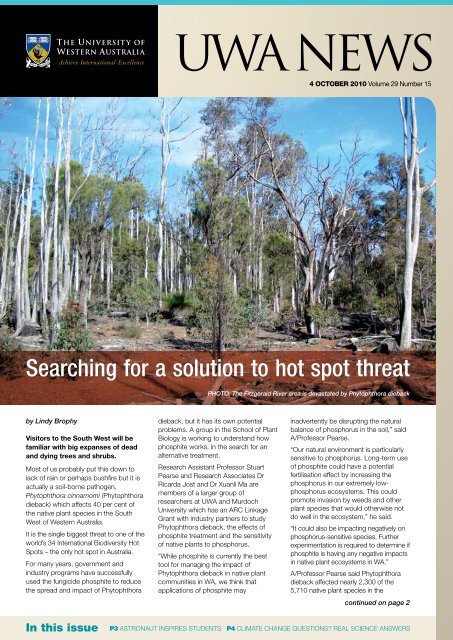
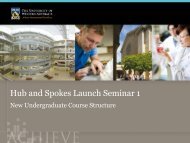
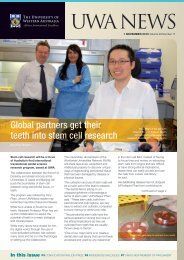
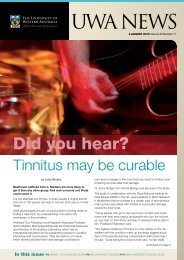
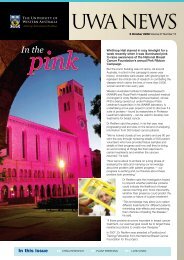
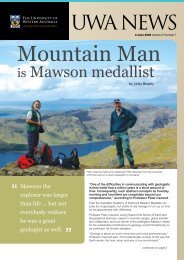
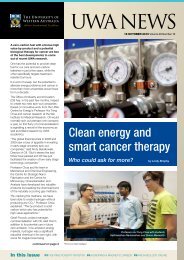
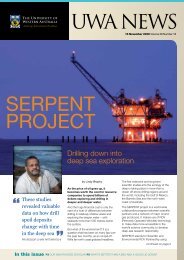

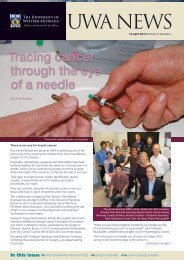
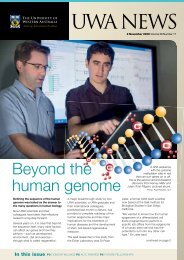
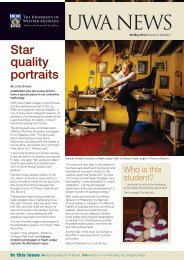
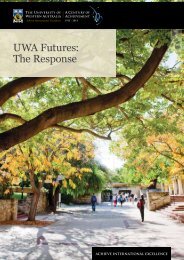
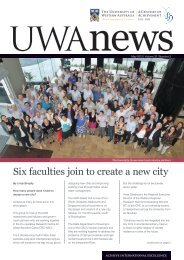
![Issue 13. 6 September 2010.pdf [PDF File, 1.7 MB] - UWA Staff - The ...](https://img.yumpu.com/26619782/1/184x260/issue-13-6-september-2010pdf-pdf-file-17-mb-uwa-staff-the-.jpg?quality=85)